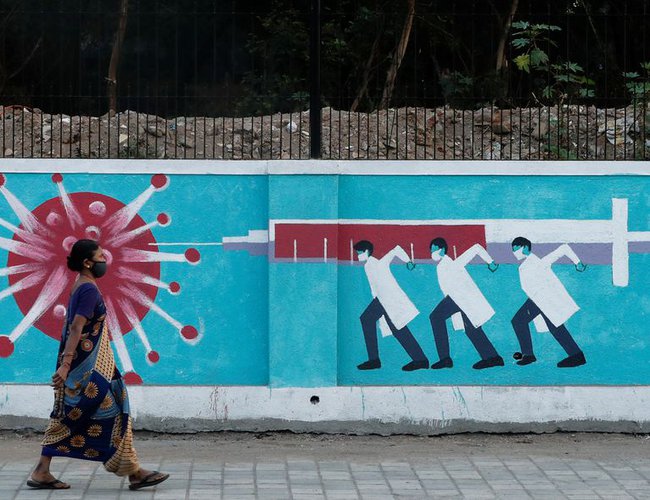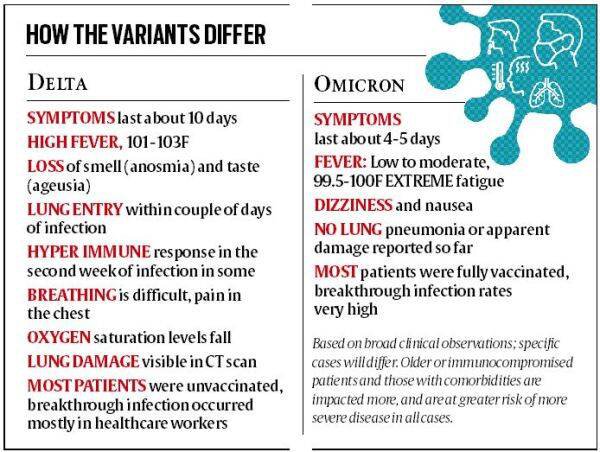
The heavily mutated Omicron variant is smashing daily case records, but hospitalisations and deaths are fewer compared to the peaks driven by Delta last year.
The US and the world reported a record 5.85 lakh and 18.95 lakh new infections on January 5 (7-day rolling average), a 14-day change of almost 250% and 165% respectively. But the respective numbers of deaths that day were around 1,300 and 6,100 — down by about 3% and 9% from 14 days ago.
Omicron, first isolated in South Africa on November 24, has 32 mutations on the spike protein. With several of these associated with higher transmissibility and immune evasion, Omicron was swiftly declared a Variant of Concern by the World Health Organization (WHO). As South Africa braced for a tsunami of sick patients, however, hospitalisations dropped — even as Omicron cases picked up.
Is Omicron really mild?
A study from South Africa published in JAMA Network reported that only 41.3% of Covid-positive people visiting hospital emergency required admission during the Omicron wave as compared to 68-69% during the Delta wave. The proportion requiring oxygen therapy was 17.6% in the Omicron wave, significantly lower than the 74% in the Delta wave.
An analysis of a large volume of data from the UK Health Security Agency published in the BMJ said persons infected with Omicron were 50-70% less likely to be admitted to hospital than those infected with Delta.
“The severity of disease with Omicron seems to be 66-80% less based on data from the UK and South Africa. South Africa’s experience also gives assurance that a country like India that has already seen high levels of infections and has vaccination comparable to countries in the west with very little vaccine hesitancy, is likely to fare better,” said Dr Anurag Agrawal, an expert in lung disease and director of the CSIR-Institute of Genomics and Integrative Biology, New Delhi.
“That, however,” he cautioned, “does not mean that Omicron is harmless; people are still landing up in ICUs”.
What has been India’s experience so far?
Even though cases are rising sharply — India reported almost 91,000 new cases on Thursday (previous 24 hours) compared to just 6,358 cases 10 days earlier — doctors across the country say almost all patients are coming in with mild symptoms: moderate fever, sore throat, headache, bodyache, and fatigue. Some patients have diarrhoea, nausea, and dizziness.
At AIIMS in New Delhi — where, Delhi Health Minister Satyendar Jain said on Monday, 81% of sequenced samples were of Omicron — no patient has developed pneumonia due to Covid-19, and none has needed oxygen or ventilator support solely for the coronavirus infection. Doctors have also reported that symptoms are resolving in about four to five days at most — much sooner than the average infection with Delta.
“There are 75 Covid-19 patients admitted in the hospital; however, nearly all of them are admitted either because they are suffering from some other condition that needs hospital care, or because they are staff members who did not have space for isolation at home. There are a couple of people on ventilators but again, they were already sick with other diseases when they contracted Covid-19,” Dr Anjan Trikha, head of the clinical management group at AIIMS trauma centre, which is a dedicated Covid-19 treatment centre, told The Indian Express on Wednesday.
“I have not seen a single patient with pure Covid-19 pneumonia or damaged lungs as we saw during the Delta wave (of April-May 2021),” he said.
He said that barring a couple of cases, almost all patients admitted to AIIMS have received at least one vaccine dose, and most are fully vaccinated.
Doctors in Mumbai have reported a similar trend. Maharashtra has the highest number of Omicron cases in the country — 797, according to data released by the Union Health Ministry on Thursday.
“Most hospitalisations are initially because of other conditions, and the patients then test positive for Covid-19,” said Dr Lancelot Pinto, epidemiologist and pulmonologist at P D Hinduja Hospital in Mumbai.
“These are early days, but we haven’t seen severe cases yet. There is a very low possibility of a drop in oxygen saturation as the Omicron variant mainly affects the upper respiratory tract,” Dr Pinto said.
Does this mean we need not worry about Omicron?
No, it does not. Omicron may cause less severe disease in most individuals, but because of its very high transmissibility, hospitals may get flooded with those who remain unimmunised, those living with comorbidities, or those with supressed immune systems.
Omicron is at least 1.5-2 times more transmissible than Delta, which has resulted in the very large numbers of infections around the world in a very short time. It is also 2-3 times more capable than Delta of infecting those who have been fully vaccinated, or those who have had a previous infection.

“The risk of severe disease is less than Delta, but that is not saying much. I am not concerned about Delhi or Mumbai which have already seen huge Delta waves, and where health systems are fairly robust. The problem will be when Omicron spreads to places where the healthcare system is patchy, and there haven’t been Delta infections,” Dr Agrawal said.
“Also, in the initial phase of a wave, younger people who are out and about are more likely to catch the infection, but the disease is also less severe in them. We will understand the problem only when it starts affecting the old and vulnerable,” he said.
Dr G C Khilnani, a former head of pulmonology at AIIMS who is now the head of pulmonary, critical care, and sleep medicine at PSRI Hospital in New Delhi, said: “If the denominator gets big enough, then we will start seeing an increase in hospitalisation. It will target those who haven’t been vaccinated, those who haven’t had the infection, or those who have comorbidities in the community.”
Also, the highly infectious and immune-evasive variant is affecting doctors and healthcare staff — at least 120 doctors have tested positive in Delhi and are isolating or quarantining at four major hospitals. If cases continue to rise sharply for an extended period, more healthcare personnel will be infected, and hospitals could see staff shortages.
Over the last one month, several major cell culture and animal model studies have suggested that Omicron is principally an upper airway disease — it prefers to replicate in the upper respiratory tract rather than deep in the lungs, which is where coronaviruses do the worst damage.
Separate teams at the University of Cambridge and the University of Glasgow have concluded that TMPRSS-2, a protein found in many lung cells, which is used by coronaviruses for viral entry and spread, does not have much affinity with Omicron.
“Indeed we showed that in lung cells expressing TMPRSS2, live Omicron virus demonstrated significantly lower replication in comparison to Delta,” said the Cambridge study, led by Dr Ravindra Gupta.
But the higher replication rate of the virus in the upper respiratory tract also means that it is easier for it to be passed on to others when an infected person coughs, sneezes, or talks. Scientists are also studying factors such as whether the variant is more stable, or is better able to infect new people in air.
Dr Agrawal cautioned that while Omicron is “less likely to infect deep in the lungs, it still can” — and “it is not a simple upper respiratory tract infection”. And this distinction becomes more important as the denominator increases, he said. “Omicron is not a risk-free natural vaccine.”
Source: The Indian Express
- PM Oli Returns Home Attending UN FFD4 Summit
- Jul 05, 2025
- Trump signs into law domestic policy bill
- Jul 05, 2025
- Putin-Trump call after US halts some arms shipments to Ukraine
- Jul 04, 2025
- USAID programs officially suspended
- Jul 03, 2025
- Thailand’s Constitutional Court suspended PM Paetongtarn Shinawatra
- Jul 02, 2025















